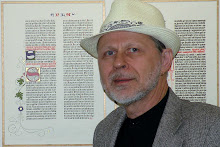23 February 2007
The crux of Thomas's choice will come down to the fact that his wife is a Torie and has been passing his missives on to her uncle. He has been feeding them to the British who thwart the Americans at every turn.
When Thomas discovers what has happened, he writes a final letter with misinformation in it and tells his wife that he, too, will be riding to war at long last because it is his duty to his country. He does, and survives the battle, but never again writes to his wife. When the dead are collected and Thomas never returns home, Ellen assumes he has been lost in battle.
In truth, he leaves the field victorious and he and Jane move to the western territories where he continues his life as a lawyer with Jane and a new name she has given him. In the rugged wilds of West Virginia, he and Jane make the kind of life for themselves that he dreamed of having with Ellen. Years later he is elected to congress as a representative from West Virginia.
His last letter is to Jane, describing what a close call he has had as President Adms thought he recognized him from years ago. Thomas has followed the love of his life and his country, rather than betray it to his tratorous wife.
In her final letter to her uncle, Ellen praises Thomas stating that it may well be his bones that lie in the tomb of the unknown soldier. She says that it is better this way than that he ever discovered her treachery against him and his country. She writes from Canada where she has fled to raise her children as goood citizens of the Crown.
Notes:
When Thomas discovers what has happened, he writes a final letter with misinformation in it and tells his wife that he, too, will be riding to war at long last because it is his duty to his country. He does, and survives the battle, but never again writes to his wife. When the dead are collected and Thomas never returns home, Ellen assumes he has been lost in battle.
In truth, he leaves the field victorious and he and Jane move to the western territories where he continues his life as a lawyer with Jane and a new name she has given him. In the rugged wilds of West Virginia, he and Jane make the kind of life for themselves that he dreamed of having with Ellen. Years later he is elected to congress as a representative from West Virginia.
His last letter is to Jane, describing what a close call he has had as President Adms thought he recognized him from years ago. Thomas has followed the love of his life and his country, rather than betray it to his tratorous wife.
In her final letter to her uncle, Ellen praises Thomas stating that it may well be his bones that lie in the tomb of the unknown soldier. She says that it is better this way than that he ever discovered her treachery against him and his country. She writes from Canada where she has fled to raise her children as goood citizens of the Crown.
Notes:
- I need to study letters of the period for style, headings, and so on.
- I need a good chronology of the American Revolution with a description of the battles that went well and those that failed.
- I need a good clean way of identifying the letters and a persona for the editor/compiler of these letters (descendent).
- I need a list of the major pieces of correspondence with the dates and parties involved.
- Thomas to Ellen
- Ellen to Thomas
- Ellen to her uncle
- Ellen's uncle to her
- Jane to her cousin
- Josiah Bartlet to his wife
- It may not work to use Josiah Bartlet as he is the namesake of the president on West Wing. He may as a result be too well known. Check other signers of the declaration for an equally obscure representative.
- I'm not sure I like Jane to be a servant or serving girl, but I can't think of another place where there would be opportunity for commerce between them and the assumption that she is deaf.
- There is a possibility of using a few lines of actual letters of the approximate dates between the fictional narratives. Jane's letter might be her journal instead of letters to a cousin.
- Is there a tomb of the unknown soldier for the Revolutionary War? If so, where is it?
Subscribe to:
Post Comments (Atom)

0 comments:
Post a Comment